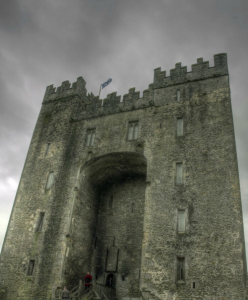. . . Goes Against Current Fashion
Every week survivalists and preppers spend millions of dollars on “survival gear” — including tents, flashlights, generators, radios, firearms and more. Do you ever think you should be doing this, too?

Your survival mentality?
But take a moment to consider this. If your efforts are all to prepare your family to “pull up the drawbridge” and “defend the castle,” you will be ignoring, if not actively alienating, the very group that will be in the best position to save you!
Who is that? It’s your immediate neighbors!
Remember Katrina, Superstorm Sandy, the earthquake and tsunami in Japan? It was hours or even days before official help got to many neighborhoods!
Lives were saved by neighbors helping neighbors.
Most lives are lost in the first 15-30 minutes.
Regardless of how prepared you are with emergency supplies, the first 15 to 30 minutes following a disaster are the most critical if you are trapped in a burning house, under fallen debris or in a mud flow.
And the only people on the scene capable of helping will be your immediate neighbors.
The Community Emergency Response Team (CERT) trainings that are available in many communities around the Country teach citizens how to best protect themselves and help their neighbors.
But in most cases – especially in more highly populated areas – the CERT training falls short of organizing trained members into functioning neighborhood units.
It’s up to you to organize your own neighborhood groups!
What about the aftermath?
Yes, you can store water, food and medicine to tide you over for the days or weeks it takes for the government and support organizations to recover.
But what good is it if your neighbors don’t do the same?
Are you prepared to fend off neighbors at gun point to protect your own supplies? Or are you going to stand by and watch them starve or die?
This is a terrible situation that you need to think long and hard about, because it could easily happen.
Once again, it’s up to you to remind your neighbors to build emergency supplies.
How to get your neighbors involved? You can start by asking yourself, and then sharing with them, these important survival questions.
In an emergency, wouldn’t it be better if you knew . . .
- The neighbors on either side of you, across the hall or across the street?
- Are they families or individuals?
- How many children do they have?
- Where are family members normally during the day?
- Are there any disabled members of the family?
- What part of the house do people sleep in?
- If people are missing at night, where would you look for them?
- Do your neighbors know what part of your house you sleep in?
- Would they know where to look for you in the middle of the night following an earthquake or tornado?
- How long would it take them to find you?
- Would you still be alive when they do find you?
In an emergency, you are your neighbors’ keeper – and they are yours.
Our current American emphasis on rugged individualism, our concerns for privacy, our worries about interfering – these views must be re-examined in the face of preparing for a neighborhood disaster.
Joseph Krueger
Your Emergency Plan Guide Team
P.S. Share this post with your Neighborhood Emergency Response Team, to get their reaction. And let us know how it is received!
Don't miss a single Advisory.
Thank you for subscribing.
Something went wrong.
